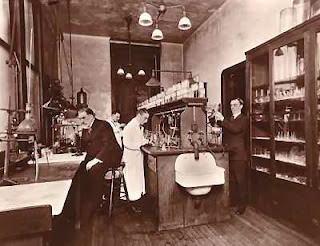 |
| Charles Norris and Alexander Gettler in the Medical Examiner's Office |
Often, I have several books on the go at once. It's a disease, I'm sure. It simply can't be helped though, new books are always cropping up, begging to be read. "Begin! Begin! Begin!" they say, and who am I to refuse?
I recently finished a pair of nonfiction books which complimented each other in odd ways that made them all the more interesting. The first is The Drunken Botanist by Amy Stewart, and it is a #1 bestseller in the botany category, if that's a recommendation to you. It's almost exactly what you'd expect from a book about plants and booze, with recipes and anecdotes from history and a really fascinating story of the use of potatoes in vodka. Near the end, the list style of the book can be a bit dry, but there is the occasional oasis of obscure plant history or science to keep you interested. For example, did you know that oranges need to get cold in order to ripen to a familiar orange glow, or they'll just stay greenish? Hence why Florida is more known for orange juice than actual orange exports: their oranges are just green enough to be off-putting. Entirely ripe! Just not orange.
The real star of this past month, however, has been one I picked up as a break from lists of which berries are best suited to liqueurs. The Poisoner's Handbook by Deborah Blum has an eye-catching title and I jumped right in. What followed is one of the most fascinating books I've ever read; I've been gushing about it to everyone who will listen, and I'm here now to strongly recommend it to you.
The subtitle is "murder and the birth of forensic medicine in Jazz Age New York" and if that doesn't sound like the best book ever then I don't know what to say to you. This book has it all. Prohibition, toxicology, politics, bootlegging, courtroom drama, inspiring historical figures, detective work, and on and on. Here you'll witness the birth of reliable toxicological evidence, all surrounded by the strange world of Prohibition in the US which lasted from 1920-1933. At the opening of the books the Coroner's Office is a mess of corruption and incompetence, but all that changes in 1918 with the appointment of Charles Norris as Chief Medical Examiner and his overhaul of the system. He hires the first forensic chemist in any US city, Alexander Gettler, and together they change New York.
I will warn you that this book contains many forays into the often grisly world of autopsies and mincing of organs to extract poisons. If you can't handle reading about the methods for detecting cyanide in a weeks-dead body, then I feel sorry for you, son. I've got ninety-nine problems but that doesn't happen to be one of them.
In other news: anyone who can recommend a good book on Prohibition or one about the history of absinthe will get a grateful handshake from me.
No comments:
Post a Comment